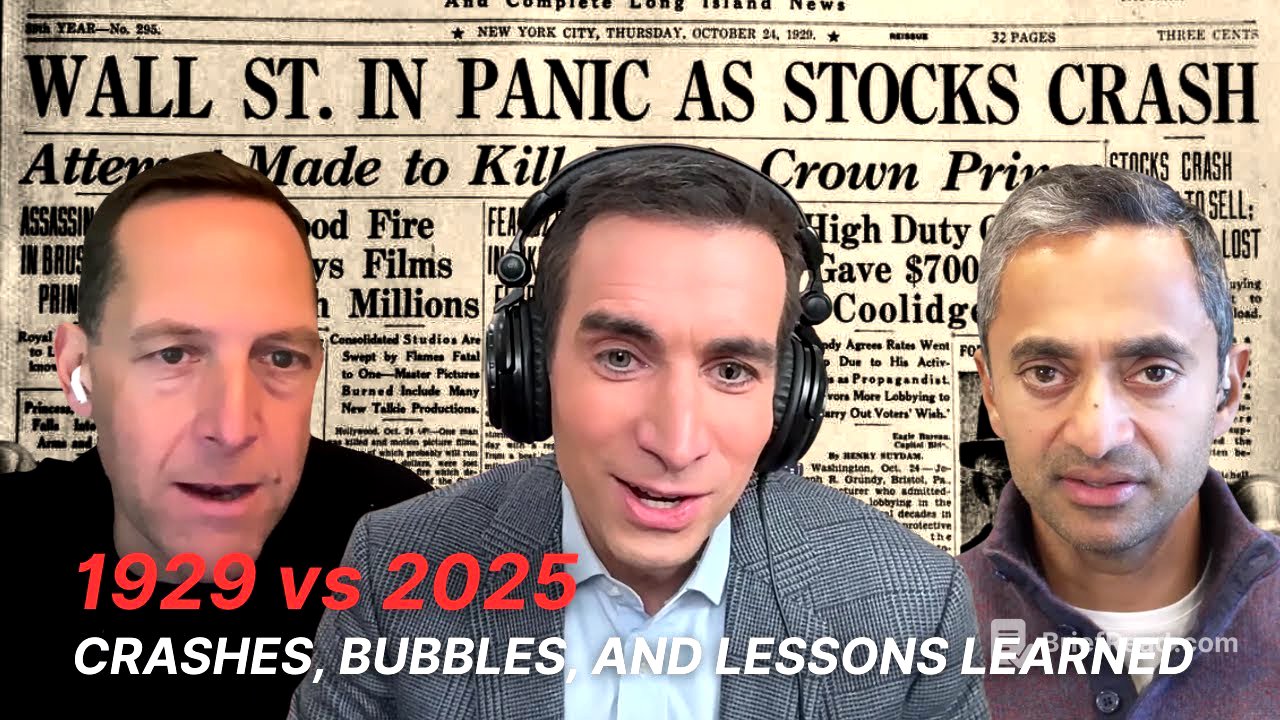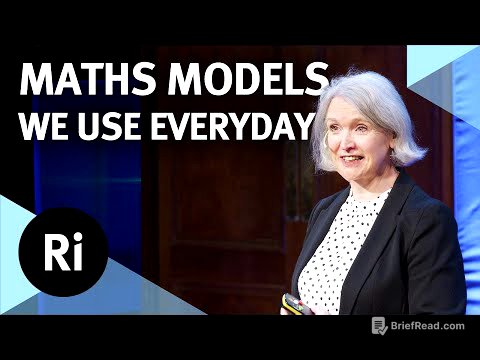TLDR;
Andrew Ross Sorkin discusses his new book, "1929," exploring the causes and characters involved in the 1929 stock market crash. The conversation covers the economic conditions leading up to the crash, the key players like Charlie Mitchell and Carter Glass, and parallels to today's financial landscape, including the role of speculation and regulation. They also touch on the potential impact of AI on employment and the economy, and the historical context of economic policies like the New Deal.
- The book explores the economic and social factors leading to the 1929 crash, including the rise of consumer credit and speculative investment.
- Key figures like Charlie Mitchell and Carter Glass are examined, highlighting their roles and motivations during the period.
- The discussion draws parallels between the 1929 crash and contemporary economic issues, such as leverage in the financial system and the impact of technology like AI.
Introduction [0:00]
Andrew Ross Sorkin joins the All-In Podcast to discuss his new book, "1929." The conversation aims to explore the reasons behind Sorkin's interest in this historical period, the lessons it offers for today, and whether current conditions suggest a similar crisis is on the horizon. Sorkin expresses his appreciation for the hosts and their in-depth discussions.
Motivation Behind Writing "1929" [1:59]
Sorkin explains that after writing "Too Big to Fail" about the 2008 financial crisis, people frequently asked him about the 1929 crash. He noticed that while many knew of the crash, few understood the details, motivations, and key players involved. Sorkin wanted to create a character-driven narrative similar to books like "Den of Thieves" and "Barbarians at the Gate," which focus on the people behind the events.
Economic Setup Before the Crash [4:00]
Prior to 1919, borrowing money was uncommon in America. General Motors introduced consumer credit in 1919 to enable car purchases, marking a significant shift. Sears Roebuck followed suit with appliances, and Charlie Mitchell of National City Bank extended credit to stocks. Brokerage houses proliferated, allowing people to borrow heavily to invest in the stock market with minimal risk assessment or regulation. In 1928, the stock market rose by 48%, creating a speculative environment where people didn't consider the possibility of the boom ending.
Social Contagion and Democratization of Finance [7:45]
People moved from farms to cities, witnessing the wealth of others and wanting to participate in the financial boom. Figures like John Raskob, similar to Elon Musk, advocated for democratizing finance, believing everyone should have the opportunity to get rich. The American dream shifted towards a lottery mentality, fueled by media like Time magazine and Forbes, which featured business leaders as celebrities. Margin lending played a crucial role, enabling widespread investment.
Parallels to Today and Research Process [11:41]
Sorkin notes eerie similarities between the 1920s and today but clarifies that his intent was to retell the story rather than draw direct parallels. He researched extensively, including examining Thomas Lamont's archives at Harvard's Baker Library, which contained transcripts of phone calls with Hoover and Roosevelt. Sorkin aimed to recreate the situation using these transcripts and other historical records. While there is leverage in today's system, Sorkin believes regulations like the SEC provide some safeguards.
Regulations and Human Element [13:21]
The discussion explores whether regulations implemented over the past century have sufficiently changed the financial landscape or if human nature will always lead to exuberance and speculative frenzies. The consensus is that the human desire for "more" drives people to find ways around regulations, leading to cycles of frothiness in areas like crypto and NFTs. Speculation is seen as necessary for innovation, but the challenge lies in encouraging it without letting it spiral out of control.
Accredited Investor Rule and Regulatory Capture [15:57]
The accredited investor rule, originating in the late 1930s, aimed to protect ordinary investors by restricting access to private company investments to the wealthy. Today, many argue for broader access, while regulators face criticism for protecting "the man." The 1940 Act, intended to delineate securities and regulate businesses, is now seen as outdated and ill-suited for today's dynamic economy. Legislative gridlock, driven by fear of potential negative outcomes, prevents necessary regulatory updates.
Key Characters in "1929" [19:30]
The book focuses on two main characters: Charlie Mitchell, the head of National City Bank, and Carter Glass, a political figure akin to Elizabeth Warren or AOC. Mitchell, known as "Sunshine Charlie," advocated for lower interest rates and loaned money to speculators and brokerage houses. Glass criticized Mitchell's actions, believing they would destabilize the economy. Their conflict plays out as Mitchell defies the Federal Reserve's attempts to curb speculation, leading to his arrest.
Glass-Steagall Act and FDIC [21:41]
The Glass-Steagall Act, which separates commercial and investment banks and establishes the FDIC, is revealed to have originated from lobbying efforts by major banks seeking to undermine JP Morgan rather than from consumer protection motives. Carter Glass himself was reportedly unhappy with the bill, feeling it had been co-opted by bankers.
Current Market Bubbles and Monetary Policy [23:09]
The discussion shifts to whether today's markets are experiencing monetary, inflationary, or speculative bubbles. While the AI investment boom is largely funded by real cash, leverage exists in real estate and energy sectors. The private credit world's leverage remains unclear. The unusual alignment of high equity prices, gold prices, and US Treasury prices suggests a potential monetary or fiscal problem.
Investment Strategy and Market Insights [26:21]
Sorkin is restricted from investing in individual stocks due to his profession but is long on the index, Bitcoin, and gold. He expresses past reservations about Bitcoin due to potential conflicts of interest. The conversation touches on the importance of understanding the actions of market participants and the challenges of being an observer rather than an actor.
Role of Journalism and Key Players Today [28:03]
Sorkin reflects on the changing landscape of journalism and the potential to be an actor in the market. He identifies key players in finance, technology, and government, including Jamie Dimon, Larry Fink, Brian Armstrong, Vlad Tenev, Sam Altman, and Elon Musk. The increasing role of AI in the economy is highlighted, with concerns that it may be overshadowing other sectors.
Impact of AI on the Economy and Employment [31:31]
The potential for AI to drive massive productivity gains and impact employment is discussed. While some believe AI will lead to job displacement, others argue it will enable workers to focus on more important tasks. The psychological impact of AI, particularly in industries like private equity, is noted, with many hesitant to embrace the technology.
Socialism, Capitalism, and the New Deal [35:16]
The conversation explores whether the crash of 1929 led to a significant move towards socialism. While the New Deal was a response to the crisis, it wasn't until later that the conversation about capitalism versus socialism gained traction. The New Deal and World War II are seen as intertwined in terms of government spending and economic impact.
Government Spending and the American Dream [37:43]
The discussion touches on the promises made to Americans regarding homeownership, education, and healthcare, and how government spending has distorted these markets. The challenge lies in convincing the public to accept less government intervention and spending.
Tariffs, National Security, and Resource Independence [44:13]
The role of tariffs in national security and resilience is examined, particularly in industries like automobiles. The importance of resource independence and strategic flexibility is emphasized, even if it means paying a premium for domestically produced goods.
Movie Rights and Audiobook [46:51]
Sorkin reveals that movie rights for "1929" are currently being negotiated. He also shares his experience recording the audiobook himself, which took approximately 30 hours.
Conclusion [49:53]
The hosts thank Sorkin for the insightful discussion and congratulate him on the release of his book. Sorkin expresses his appreciation for the podcast and its engaging content.









